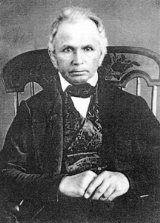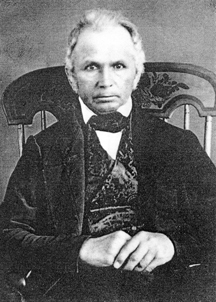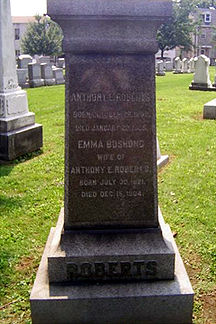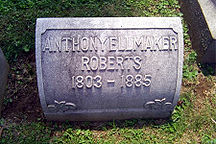
Anthony Ellmaker Roberts
Encyclopedia

.jpg)
United States
The United States of America is a federal constitutional republic comprising fifty states and a federal district...
politician, member of the United States House of Representatives
United States House of Representatives
The United States House of Representatives is one of the two Houses of the United States Congress, the bicameral legislature which also includes the Senate.The composition and powers of the House are established in Article One of the Constitution...
from 1855 to 1859, an abolitionist
Abolitionism
Abolitionism is a movement to end slavery.In western Europe and the Americas abolitionism was a movement to end the slave trade and set slaves free. At the behest of Dominican priest Bartolomé de las Casas who was shocked at the treatment of natives in the New World, Spain enacted the first...
and close associate of Thaddeus Stevens
Thaddeus Stevens
Thaddeus Stevens , of Pennsylvania, was a Republican leader and one of the most powerful members of the United States House of Representatives...
.
Early life
Anthony Ellmaker Roberts was born near Barneston Station in Chester CountyChester County, Pennsylvania
-State parks:*French Creek State Park*Marsh Creek State Park*White Clay Creek Preserve-Demographics:As of the 2010 census, the county was 85.5% White, 6.1% Black or African American, 0.2% Native American or Alaskan Native, 3.9% Asian, 0.0% Native Hawaiian, 1.8% were two or more races, and 2.4% were...
, Pennsylvania
Pennsylvania
The Commonwealth of Pennsylvania is a U.S. state that is located in the Northeastern and Mid-Atlantic regions of the United States. The state borders Delaware and Maryland to the south, West Virginia to the southwest, Ohio to the west, New York and Ontario, Canada, to the north, and New Jersey to...
. He was the son of John Roberts and Mary Ellmaker. His family moved to Lancaster County
Lancaster County, Pennsylvania
Lancaster County, known as the Garden Spot of America or Pennsylvania Dutch Country, is a county located in the southeastern part of the Commonwealth of Pennsylvania, in the United States. As of 2010 the population was 519,445. Lancaster County forms the Lancaster Metropolitan Statistical Area, the...
in 1804. Growing up, Roberts received the limited education available from the local common school
Common school
A common school was a public school in the United States or Canada in the nineteenth century. The term 'common school' was coined by Horace Mann, and refers to the fact that they were meant to serve individuals of all social classes and religions....
. In 1816, at the age of thirteen, Roberts began working for his uncle Isaac Ellmaker as a clerk in Isaac's country store in New Holland
New Holland, Pennsylvania
New Holland is a borough in Lancaster County in Pennsylvania, USA. The population was 5,092 at the 2000 census. New Holland was settled in 1728 by John Michael and John Phillip Ranc . Before it became known as New Holland, it had been called Hog Swamp, Earltown and New Design...
; at the age of twenty, Anthony received a share in the ownership of the store, and continued in the business until 1839.
Early political career
On October 8, 1839, Roberts was elected on the Democratic AntimasonicAnti-Masonic Party
The Anti-Masonic Party was the first "third party" in the United States. It strongly opposed Freemasonry and was founded as a single-issue party aspiring to become a major party....
ticket as Sheriff
Sheriff
A sheriff is in principle a legal official with responsibility for a county. In practice, the specific combination of legal, political, and ceremonial duties of a sheriff varies greatly from country to country....
of Lancaster County. He then moved to Lancaster City
Lancaster, Pennsylvania
Lancaster is a city in the south-central part of the Commonwealth of Pennsylvania. It is the county seat of Lancaster County and one of the older inland cities in the United States, . With a population of 59,322, it ranks eighth in population among Pennsylvania's cities...
, where he served his three-year term as sheriff from 1839 to 1842. In the fall of 1843, Roberts ran for a seat on the Twenty-Eighth Congress on the Anti-Masonic Party ticket, but he was defeated by the Whig Party
Whig Party (United States)
The Whig Party was a political party of the United States during the era of Jacksonian democracy. Considered integral to the Second Party System and operating from the early 1830s to the mid-1850s, the party was formed in opposition to the policies of President Andrew Jackson and his Democratic...
candidate, Jeremiah Brown
Jeremiah Brown
Jeremiah Brown was a Whig member of the U.S. House of Representatives from Pennsylvania.-Biography:Jeremiah Brown was born in Little Britain Township, Pennsylvania. He engaged in milling and agricultural pursuits. He served as a member of the Pennsylvania House of Representatives in 1826...
. On May 16, 1850, Roberts was appointed by US President
President of the United States
The President of the United States of America is the head of state and head of government of the United States. The president leads the executive branch of the federal government and is the commander-in-chief of the United States Armed Forces....
Zachary Taylor
Zachary Taylor
Zachary Taylor was the 12th President of the United States and an American military leader. Initially uninterested in politics, Taylor nonetheless ran as a Whig in the 1848 presidential election, defeating Lewis Cass...
as the United States Marshal
United States Marshals Service
The United States Marshals Service is a United States federal law enforcement agency within the United States Department of Justice . The office of U.S. Marshal is the oldest federal law enforcement office in the United States; it was created by the Judiciary Act of 1789...
for the Eastern District of Pennsylvania, a position he held until May 29, 1853.
The incident
Just a few months after Roberts was appointed Marshal, the United States CongressUnited States Congress
The United States Congress is the bicameral legislature of the federal government of the United States, consisting of the Senate and the House of Representatives. The Congress meets in the United States Capitol in Washington, D.C....
passed the Fugitive Slave Law
Fugitive Slave Law of 1850
The Fugitive Slave Law or Fugitive Slave Act was passed by the United States Congress on September 18, 1850, as part of the Compromise of 1850 between Southern slave holding interests and Northern Free-Soilers. This was one of the most controversial acts of the 1850 compromise and heightened...
as part of the Compromise of 1850
Compromise of 1850
The Compromise of 1850 was a package of five bills, passed in September 1850, which defused a four-year confrontation between the slave states of the South and the free states of the North regarding the status of territories acquired during the Mexican-American War...
. The law put Roberts in a difficult position as a Marshal who was also an abolitionist, because he was expected to enforce laws promoting the return of runaway slaves to the South
Southern United States
The Southern United States—commonly referred to as the American South, Dixie, or simply the South—constitutes a large distinctive area in the southeastern and south-central United States...
or risk a fine of one thousand dollars
United States dollar
The United States dollar , also referred to as the American dollar, is the official currency of the United States of America. It is divided into 100 smaller units called cents or pennies....
per incident.
After many tense incidents in the north between local communities harboring runaway slaves
and southern slave owners seeking to reclaim their "property". An incident arose in which blood was shed: on September 11, 1851, Edward Gorsuch, a Maryland
Maryland
Maryland is a U.S. state located in the Mid Atlantic region of the United States, bordering Virginia, West Virginia, and the District of Columbia to its south and west; Pennsylvania to its north; and Delaware to its east...
slave owner, came to Christiana
Christiana, Pennsylvania
Christiana is a borough in Lancaster County, Pennsylvania, United States. The population was 1,124 at the 2000 census. In 1851 it was the site of the Battle of Christiana .-Geography:...
in Lancaster County to reclaim a runaway slave named Nelson Ford. A group of runaway slaves in Christiana, headed by William Parker, had formed a vigilante group to protect one another from any attempts by Southern slave owners to enslave them again.
Edward Gorsuch soon learned that his former slave was staying with William Parker. He went to William Parker’s house along with a small posse
Gang
A gang is a group of people who, through the organization, formation, and establishment of an assemblage, share a common identity. In current usage it typically denotes a criminal organization or else a criminal affiliation. In early usage, the word gang referred to a group of workmen...
to take back the slave he claimed to own. The fugitive slaves, led by William Parker, sounded an alarm, which summoned other blacks
African American
African Americans are citizens or residents of the United States who have at least partial ancestry from any of the native populations of Sub-Saharan Africa and are the direct descendants of enslaved Africans within the boundaries of the present United States...
as well as some local white abolitionists. As Edward Gorsuch advanced to reclaim his “property”, William Parker led an active resistance, and a small battle ensued. One hour later the incident was over and Gorsuch lay dead.
Two days later, Anthony Roberts was on the scene with a detachment of Philadelphia police.
Those who participated in the resistance, including the white bystanders, were arrested and put on trial for treason, beginning with the white Quaker
Religious Society of Friends
The Religious Society of Friends, or Friends Church, is a Christian movement which stresses the doctrine of the priesthood of all believers. Members are known as Friends, or popularly as Quakers. It is made of independent organisations, which have split from one another due to doctrinal differences...
Castner Hanway. Thaddeus Stevens took on the case as the defense attorney
Lawyer
A lawyer, according to Black's Law Dictionary, is "a person learned in the law; as an attorney, counsel or solicitor; a person who is practicing law." Law is the system of rules of conduct established by the sovereign government of a society to correct wrongs, maintain the stability of political...
, while Roberts was responsible for keeping those on trial in custody.
Involvement in the slaves' trial
The prosecuting attorneysCounty attorney
A county attorney in many areas of the United States is the chief legal officer for a county or local judicial district. It is usually an elected position...
held two blacks in “voluntary” custody for the case. These men discovered Edward Gorsuch’s plot to reclaim his slaves the day before the resistance took place and warned William Parker. The prosecution was planning to use their testimony to prove that the Christiana incident was an organized effort to resist the laws of the United States. Two weeks before the trial began, however, the two blacks mysteriously disappeared from custody. The prosecution hinted that Marshal Roberts had let them go, since there was no evidence of a broken lock or use of force in their escape. The defense denied the accusation.
Twenty-one years later, William Still
William Still
William Still was an African-American abolitionist, conductor on the Underground Railroad, writer, historian and civil rights activist....
, the black leader of the Philadelphia Underground Railroad
Underground Railroad
The Underground Railroad was an informal network of secret routes and safe houses used by 19th-century black slaves in the United States to escape to free states and Canada with the aid of abolitionists and allies who were sympathetic to their cause. The term is also applied to the abolitionists,...
, revealed the truth. While in custody, the two black men had been identified by their owner as runaway slaves. Still reports that the two men did indeed find a “true friend and ally” in Roberts. Still clarified the matter further when he wrote in response to the suspicions of the prosecuting attorney with respect to Anthony Roberts: “To add
now, that those suspicions were founded on fact, will doubtless do him no damage”.
Roberts did other things within his power to sway the outcome of the case. As the Marshal, Roberts was responsible for summoning potential jurors
Jury
A jury is a sworn body of people convened to render an impartial verdict officially submitted to them by a court, or to set a penalty or judgment. Modern juries tend to be found in courts to ascertain the guilt, or lack thereof, in a crime. In Anglophone jurisdictions, the verdict may be guilty,...
. Robert J. Brent, Maryland’s Attorney General
Attorney General of Maryland
The Attorney General of Maryland is the chief legal officer of the State of Maryland in the United States and is elected by the people every four years with no term limits...
, who was part of the prosecution team, later claimed that “a large majority” of the potential jurors called by Marshal Roberts were “unfavorable to a conviction”. On November 27, 1851, Anthony permitted a Thanksgiving
Thanksgiving
Thanksgiving Day is a holiday celebrated primarily in the United States and Canada. Thanksgiving is celebrated each year on the second Monday of October in Canada and on the fourth Thursday of November in the United States. In Canada, Thanksgiving falls on the same day as Columbus Day in the...
meal to be prepared for all the prisoners, and even joined them in the prison for the meal. The incident caused the Maryland Attorney General to censure Anthony’s lack of “impartiality
Impartiality
Impartiality is a principle of justice holding that decisions should be based on objective criteria, rather than on the basis of bias, prejudice, or preferring the benefit to one person over another for improper reasons.-Philosophical concepts of impartiality:According to Bernard Gert, "A is...
” and “decorum
Etiquette
Etiquette is a code of behavior that delineates expectations for social behavior according to contemporary conventional norms within a society, social class, or group...
”.
Scott's testimony
Later in the trial, Roberts participated in another event that had a major role in determining the outcome of the case. A certain black named George Washington Scott was going to offer testimony to the fact that he was at the scene of the battle on September 11, that he saw the men who shot Gorsuch, and that the group was organized to “resist all slave holders”. When called upon to testify in court, however, he changed his story and claimed that he was not present that day (an admission that came as quite a surprise to the prosecuting attorneys). It turned out that the night before, Roberts had allowed several black men into the prison to “converse” with Scott.Maryland’s Attorney General cried foul, and indirectly accused Marshal Roberts of witness tampering, citing the interesting fact that all of the black men in custody had a neat appearance except for Scott who was “ragged, dirty, and filthy”. Despite protests from the prosecution, Scott maintained that he was not at the battle scene and that he had initially lied about being there because he was scared. In the end, Castner Hanway was acquitted. Since his was a test case, the prosecution decided not to prosecute the remaining cases.
Late political career
In the 1854 congressional electionUnited States House election, 1854
The U.S. House election, 1854 was an election for the United States House of Representatives in 1854.The 1854 election was the beginning of the end for both the Democratic and Whig Parties. Party lines were very blurred and a minority government was formed...
, Thaddeus Stevens put his support behind Roberts as the Know-Nothing candidate for the congressional seat of the ninth district of Pennsylvania. The Whigs were appalled by Roberts’ candidacy; an article in the Lancaster Examiner reflects this attitude:
- "Inconsistent in everything else, he is consistent only in his blind obedience to Thaddeus Stevens. If he is elected, we shall be represented by the shadow of Mr. Stevens without his brains."
Despite such resistance to Anthony Roberts, on October 13, 1854, Roberts defeated his rival and relative, Isaac Ellmaker Hiester
Isaac Ellmaker Hiester
Isaac Ellmaker Hiester was an American political leader of the nineteenth Century. He was a member of the Hiester Family political dynasty. He was the son of William Hiester and cousin of Hiester Clymer....
, by a vote of 6,561 to 5,371 (with 4,266 votes going to the Democratic
Democratic Party (United States)
The Democratic Party is one of two major contemporary political parties in the United States, along with the Republican Party. The party's socially liberal and progressive platform is largely considered center-left in the U.S. political spectrum. The party has the lengthiest record of continuous...
nominee). Thus Roberts won Pennsylvania’s Ninth District seat in the Thirty-Fourth Congress.
That same year, the Republican Party
Republican Party (United States)
The Republican Party is one of the two major contemporary political parties in the United States, along with the Democratic Party. Founded by anti-slavery expansion activists in 1854, it is often called the GOP . The party's platform generally reflects American conservatism in the U.S...
was beginning to form around the central tenet of stopping the spread of slavery. In 1855 and 1856, Roberts was among the leaders who established the Party in Pennsylvania, and he strongly advocated its principles. When his first term in Congress ended, he sought re-election as a Republican, and won a second term. During his second term he served on the Public Buildings and Grounds Committee
United States Senate Committee on Public Buildings and Grounds
The U.S. Senate Committee on Public Buildings and Grounds was a committee of the United States Senate from 1883 until 1946. It was preceded by the United States Congress Joint Committee on Public Buildings and Grounds and succeeded by the United States Senate Committee on Public Works.-Committee...
. Altogether, he served in Congress from March 4, 1855, to March 3, 1859, as the first Republican to represent Lancaster County in Congress.
He was not a candidate for re-nomination in 1858. Roberts continued in politics as an active organizer of the Republican Party in Pennsylvania. He ran for Mayor of Lancaster in 1867, but was defeated by the Democratic candidate in a city that had strong Democratic support. Roberts' obituary, published in the Clarion on January 24, 1885, states that his actions in Congress “were always true to his constituents”.
Other activities
Roberts active public life resulted in his appointment to many committees. In 1830 he waspart of a committee to distribute remonstrances (protests) in Earl Township
Earl Township, Lancaster County, Pennsylvania
Earl Township is a township in northeastern Lancaster County, Pennsylvania, United States. The population was 6,183 at the 2000 census.-Geography:...
, in response to a proposal to form Conestoga County
Conestoga Township, Pennsylvania
Conestoga Township is a township in west central Lancaster County, Pennsylvania, United States. At the 2000 census the population was 3,749.-Geography:According to the U.S...
from parts of Lancaster, Chester
Chester County, Pennsylvania
-State parks:*French Creek State Park*Marsh Creek State Park*White Clay Creek Preserve-Demographics:As of the 2010 census, the county was 85.5% White, 6.1% Black or African American, 0.2% Native American or Alaskan Native, 3.9% Asian, 0.0% Native Hawaiian, 1.8% were two or more races, and 2.4% were...
, and Berks
Berks County, Pennsylvania
-Demographics:As of the census of 2000, there were 373,638 people, 141,570 households, and 98,532 families residing in the county. The population density was 435 people per square mile . There were 150,222 housing units at an average density of 175 per square mile...
counties.
On April 5, 1841, Roberts was chosen as a secretary of a meeting in which citizens of Lancaster adopted resolutions to express their sorrow and grief over the unexpected death of President William Henry Harrison
William Henry Harrison
William Henry Harrison was the ninth President of the United States , an American military officer and politician, and the first president to die in office. He was 68 years, 23 days old when elected, the oldest president elected until Ronald Reagan in 1980, and last President to be born before the...
. On June 13, 1848, Roberts was appointed to a committee to solicit contributions to mitigate the losses suffered two weeks earlier in a devastating fire in Allentown
Allentown, Pennsylvania
Allentown is a city located in Lehigh County, Pennsylvania, in the United States. It is Pennsylvania's third most populous city, after Philadelphia and Pittsburgh, and the 215th largest city in the United States. As of the 2010 census, the city had a total population of 118,032 and is currently...
. After the death of President James Buchanan
James Buchanan
James Buchanan, Jr. was the 15th President of the United States . He is the only president from Pennsylvania, the only president who remained a lifelong bachelor and the last to be born in the 18th century....
in 1868, Roberts was appointed as one of the vice-presidents of a committee to arrange the president’s funeral services. Roberts also served for a time as chairman of the visiting committee of the School Board in Lancaster.
Roberts owned a lot of real estate in and near New Holland
New Holland, Pennsylvania
New Holland is a borough in Lancaster County in Pennsylvania, USA. The population was 5,092 at the 2000 census. New Holland was settled in 1728 by John Michael and John Phillip Ranc . Before it became known as New Holland, it had been called Hog Swamp, Earltown and New Design...
in Lancaster County. He seems to have used his real estate holdings to promote education and the general public welfare. On October 22, 1845, he bought a plot of ground with a brick house on it known as the Methodist
Methodism
Methodism is a movement of Protestant Christianity represented by a number of denominations and organizations, claiming a total of approximately seventy million adherents worldwide. The movement traces its roots to John Wesley's evangelistic revival movement within Anglicanism. His younger brother...
Meeting House. Six years later he sold it to the Earl School District.
In 1850, he completed construction on what was then the largest dwelling in eastern Lancaster County. The construction's purpose was mysterious until its comletion, when Roberts announced that a select school would be opened in part of his home. He also assisted in freeing many pieces of property from rent structures that harmed the common people dwelling in New Holland. In 1860, in the City of Lancaster, he was one of the incorporators of an institution dedicated to providing homes for poor and uncared for children. One biographer notes that "[the common people of New Holland] looked upon him as their friend and champion of their rights". As a close friend of Thaddeus Stevens, Roberts was designated one of the executors of Stevens' will.
Family and late life



